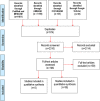Biopsychosocial factors associated with non-recovery after a minor transport-related injury: A systematic review
- PMID: 29894490
- PMCID: PMC5997362
- DOI: 10.1371/journal.pone.0198352
Biopsychosocial factors associated with non-recovery after a minor transport-related injury: A systematic review
Abstract
Background: Globally, road transport accidents contribute significantly to mortality and burden of disability. Up to 50 million people suffer a transport-related non-fatal injury each year, which often leads to long-term disability. A substantial number of people with minor injuries struggle to recover and little is known about the factors leading to poor or non-recovery. The aim of this paper is to present a systematic review of biopsychosocial factors related to poor or non-recovery after a minor transport-related injury.
Methods and findings: Studies were selected through searches of PubMed, Medline, Embase, and Cochrane library. Methodological quality was assessed using a Scottish Intercollegiate Guidelines Network (SIGN) critical appraisal checklist for quantitative cohort studies and Standards for Reporting Qualitative Research (SRQR) checklist for qualitative articles. Data were extracted using the Cochrane data extraction tool based on the biopsychosocial model of health (BPS). In total, there were 37 articles included. However, heterogeneity of the techniques and tools used to assess factors and outcomes across studies meant that pooling of results to determine biopsychosocial factors most predictive of poor or non-recovery was not possible. Hence, a narrative synthesis was conducted and shown multiple factors to be associated with poorer outcomes or non-recovery, most being identified in the biological and psychological domain of the BPS model. Factors that were the most representative across studies and have shown to have the strongest associations with poor or non-recovery were high initial pain intensity, pain duration and severity, pre-accident physical and mental health status and pain catastrophising.
Conclusions: This review demonstrates the complexity of recovery and a challenge in reporting on predictors of recovery. It is evident that a range of multi-factorial biopsychosocial factors impact recovery. These factors are often inter-connected and multi-faceted and therefore, it was not feasible to select or focus on one single factor. In defining the most predictive factors, further research is required, yet the consensus around which tools to use to measure recovery outcomes is needed and is highly recommended. Regardless of the descriptive nature, the review demonstrated that high levels of post-injury pain are associated with poorer outcomes such as chronic pain and physical and mental disability. Therefore, early targeting of modifiable factors such as pain, pain catastrophizing and arising comorbidities such as PTSD, depression and anxiety may assist in reducing chronic pain and ongoing related disabilities.
Systematic review trial registration number: Systematic review protocol was registered in International Prospective Register for Systematic Reviews (PROSPERO) on 14 December 2016. Registration number CRD42016052276.
Conflict of interest statement
The authors have declared that no competing interests exist.
Figures
References
-
- World Health Organisation. World report on road traffic injury prevention. Washington D.C.: World Health Organisation; 2004.
-
- World Health Organisation. World report on road traffic injury prevention Geneva. Switzerland.2004.
-
- Jones GT, Nicholl BI, McBeth J, Davies KA, Morriss RK, Dickens C, et al. Role of road traffic accidents and other traumatic events in the onset of chronic widespread pain: Results from a population-based prospective study. Arthritis care & research. 2011;63(5):696–701. 10.1002/acr.20417 . - DOI - PubMed
Publication types
MeSH terms
LinkOut - more resources
Full Text Sources
Other Literature Sources
Medical



